
in this issue Third Quarter 2002, Vol. 6 No. 4
- Selective Observation Threatens America's Legacy
- All History is Ultimately Redemptive
- Nigeria Riot Media Coverage Avoids Hard Subjects
- Media Shuts Eyes to Real Story in Ivory Coast
- Bali Bombing Exposes Real Ambitions
- Spiritual Landscape of Iraq
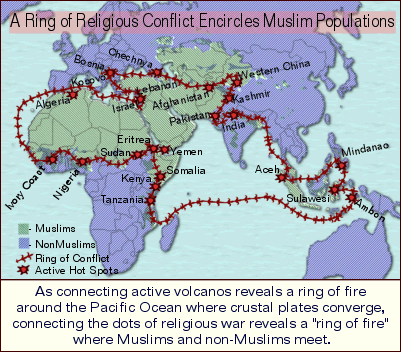
Feature:
Selective Observation Threatens America's Legacy
by Bruce Sidebotham
Conflicts in distant nations receive little attention unless westerners are threatened. Bombs have been taking lives in Indonesia for years, but it took the bombing of Australians at a night club in Bali to make front pages. Riots for advancing Muslim law have plagued Nigeria for years, but it took violent demonstrations against the Miss World contest for news networks to notice. Civil unrest in the Ivory Coast rages unabated, and it slips back into oblivion now that trapped western missionary kids have been safely snatched by French and American soldiers.
Lack of attention to "unworthy news" has blinded most voting Americans to global realities. With attacks in America and Israel and even in Indonesia, terrorists do not primarily intend to defeat or intimidate America and Israel. These attacks are mostly for internal consumption. By demonstrating their power and pervasiveness the militants intend to intimidate, control, and ultimately dominate the Muslim world. Muslim terrorism against non-Muslims is minuscule compared to the unnoticed violence of militant Muslims against their own governments and people.
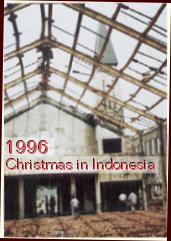
At least two years before 9-11, a friend in Indonesia watched dugout canoes ferry rifles and hand grenades from a blacked out ship to a remote beach in Sumatra. Deep in the jungle, he shared the gospel with Taliban soldiers training Indonesians how to shoot. Some of these trained youths entered the renegade militia which torched Christian villages, killed tens of thousands, and displaced hundreds of thousands.
Even after the Taliban backed "Attack on America," our attention flies to terrorism rather than to the militant Islam that builds militias (e.g. Indonesia and Ivory Coast), censors journalists (e.g. Isioma Daniel in Nigeria), issues death warrants (e.g. Salman Rushdie), and intimidates allied governments (e.g. Pakistan and Saudi Arabia).
Most Americans blame 9-11 on failed intelligence, but the intelligence failure was merely a symptom of the real underlying cause. Intelligence failed because public policies were based on the ignorance that results from the apathy of most Americans to the plight of non-western peoples.
Sooner or later history will treat America like every other nation. Will we be remembered as a great people who were aware of their surroundings and showed genuine concern for the physical and spiritual welfare of others or will we be remembered for thinking only of ourselves?
Feature:
All History Is Ultimately Redemptive
by Carson Tavenner
War on terrorism has brought new perspective to America and its armed forces. Debate about whether the Cold War has ended seems trivial. Our new enemy challenges not only our nation but also the very foundations of our view of God and humanity.
As the heavens declare God's glory (Psalm 19), so the study of current events in the light of history reveals redemptive truths about God and ourselves. Though as a professor of world history at the Air Force Academy I cannot preach the gospel in the classroom, I can confront students with some historically revealed truths about civilization, warfare and man that are relevant.
Nature of Civilization
In the summer of 1993 in the journal Foreign Affairs, Samuel Huntington rocked diplomats and scholars by proposing that a "clash of civilizations" was defining world history. Are non-western cultures "going back" in time to seek out and connect with their original identities, or are people around the world peacefully combining their original culture with the ever-expanding western one? Whatever the answer, reflecting on terrorism reveals an evil that clashes with civilization itself.
Nature of Warfare
Nearly 200 years ago Carl Von Clausewitz counseled that military objectives should submit to public policy. Civilian control of the military through national command authorities as well as the familial relationship between the military and its citizenry has helped drive western success. The American military succeeds when it is an arm of the American people. Failure in Vietnam revealed these relationships cannot be taken for granted. Successful civil-military relationship requires effective listening, and communicating concepts of warfare and arguments for peace.
Few non-western nations esteem this relationship. Military victory alone will not deter radical yet often unpopular anti-western agendas. Japan and Germany are our allies today, because following World War II we helped them rebuild their devastated countries. Preserving civilization will require similar actions of moral might.
Nature of Man
Inhumanity runs throughout the pages of history. It may be history's most common and significant theme. Requiring students to consider the failure of political and economic systems throughout the ages prepares them to address their own basis for hope. Objectively considering human history apart from Christ leads to despair.
The question of whether the "War on Terrorism" is a "just war" presumes ethical standards. America has done a fine job so far showing its unwillingness to simply reach out in anger to crush Islam. This is inspired history. All the same, the believer knows that history alone lacks the basis of truth from which we can pull real solutions for real problems. From where -- from whom -- do we find our own civilization's inspiration? That, I believe, will become the question for this century.
Conclusion
Jesus Christ is not confined to Biblical history. He is relevant to the path our nation walks, as its military forces try to bring justice and hope to the despondent world of Muslim terrorists. Jesus appears in the pages of history texts, as secular as they may be, with weeping eyes. Though proselytizing the name of Jesus is not generally allowed in the classroom, bringing students' eyes to focus on the reality of human suffering and the accompanying reality of man's failure to contain it -- regardless of ideology -- is. History itself is then able to stir up questions about truth that no student can ignore.
News:
Nigeria Riot Media Coverage Avoids Hard Subjects
On November 20th enraged Nigerians took to the streets, allegedly protesting the planned Miss World contest to be held in the capital, Abuja, and comments in a newspaper that Mohammed would have approved and probably desired to marry one of the contestants. The mobs burned Christian homes and churches. Some Christians fought back. The riots destroyed 22 churches and 8 mosques and left over 400 dead, 1,200 injured, and 12,000 homeless.
Western media blurred distinctions between perpetrators and retaliators by calling it "violence between Christians and Muslims." Fellow journalists blamed Nigerian columnist, Isioma Daniel, for her culturally insensitive insights. News commentators scolded Miss World contest organizers for arrogantly planning the riskque event in a country where some provincial governments sentence adulterous women to death by stoning. One feminist, quoted in Britain's Guardian newspaper, declared, "These girls will be wearing swimwear dripping with blood."
Since when do beauty pageants require approval from radical religious minorities? Under what legal system may offended parties be excused for destroying property and taking lives in the community that insults them? The answer is, today under post-modern relativism and under fundamentally applied Muslim law.
Aside from confusing the issues, mass media has avoided fingering the real culprits. According to Nigerian church leaders, this violence in Kanduna was carefully orchestrated by fundamentalist Muslim leaders for political ends. The targeted Christians had nothing to do with either the offensive article in This Day newspaper or the planned Miss World contest (which most Christians also oppose), but they have a lot in common with resisting full implementation of shari'a law in the Kanduna province.
Eleven other Nigerian provinces have fully implemented shari'a law over the last three years. Saudi Arabia, Iran, Libya, Sudan and Malaysia have been giving clerical and judicial assistance. However, because Kanduna is 40% Christian, its local government has resisted fully implementing shari'a.
These riots were not a spontaneous reaction to the alleged insult. They began five days after the insulting article was published. That's the time it took for organizers to fan hostility with nightly preaching in local mosques and to mobilize youth leaders with phone messages.
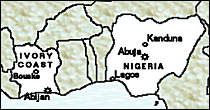 The "war on terrorism" is not America's war, and it did not start on 9-11. It is a war fought on every continent to preserve western of conscience and expression against religious fanatics wanting to subject the whole world to fundamental interpretations of Muslim religious law.
The "war on terrorism" is not America's war, and it did not start on 9-11. It is a war fought on every continent to preserve western of conscience and expression against religious fanatics wanting to subject the whole world to fundamental interpretations of Muslim religious law.
News:
Media Shuts Eyes to Real Story in Ivory Coast
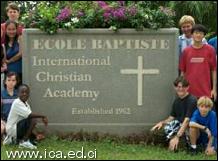 Once a model of African democracy and progress, the Ivory Coast has fallen into anarchy. Rebels control the northern half of the country dominated by the Dioula tribe. Forces loyal to the government occupy the southern predominantly Baoule tribal region.
Once a model of African democracy and progress, the Ivory Coast has fallen into anarchy. Rebels control the northern half of the country dominated by the Dioula tribe. Forces loyal to the government occupy the southern predominantly Baoule tribal region.
News of the civil war finally hit front pages when cross-fire pinned down teachers and nearly 200 missionary kids attending the International Christian Academy in Bouake. French troops and US Special Forces rescued them on September 25th. Coverage, however, failed to detail complex religious and ethnic elements of the conflict.
Due to warfare and famine in other West African countries, 40% of Ivory Coast's people are now immigrants from surrounding nations. While only 27% of native Ivorians are Muslim, Muslims now form the majority of Ivory Coast's total population.
The rebel soldiers are northern Muslims demanding a change of government. Christians are loyal to the existing government. From one of the rebel occupied cities on October 12th an Ivorian Christian wrote,
All Muslims attack and kill the other populations, generally Christian, under the supervision of the rebels. . . . Only districts lived in by the Christians and the animists are traumatized and held. Those populations can make nothing. They starve and thirst. While districts lived massively by the Muslims are provided for by the rebels; shops are opened, the population eats, drinks and dances with the rebels.Preparations for the uprising appear to have been thorough. Ideological, financial and material support comes from external sources. Leaders were educated in Egyptian and Saudi Arabian Quranic schools. Combatants sport images of Osama bin Laden and boast of limitless access to sophisticated weapons including armored vehicles.
The secular and democratic government of the Ivory Coast is not just combating an internal rebellion but a powerful, wealthy, and deadly serious external foe seeking to take advantage of shifting demographics to propagate the rule of Muslim law.
News:
Bali Bombing Exposes Real Ambitions
by Mark Durie
In discussion of the Bali tragedy, many Australians are searching for a reason why so many innocent people were killed. Surely such hatred has some explanation? Could it be something we have done? Was it supporting independence for East Timor? Last decade's war on Iraq? Our lifestyle? Our indifference to world poverty?
Strategic Goals
We must understand this bombing, and others like it, in terms of the strategic goals and world view of the terrorist organizations which execute them. All these groups aim to establish shari'a or "Islamic way" as the law of the land. They reject existing regimes in Muslim countries as un-Islamic. Secondly, they all believe that jihad is the best method for accomplishing this objective. Countless books, tracts and training schools emphasize these two principles.
Attack on Diversity
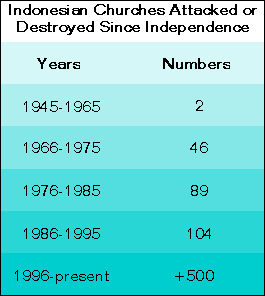 At the time of independence from the Dutch in 1945, calls for Indonesia to become an Islamic state were successfully resisted. The authors of Indonesia's constitution opted instead for pluralism, affirming a diversity of religions including Islam, Christianity, Hinduism and Bhuddism. The national motto is "Unity in Diversity."
At the time of independence from the Dutch in 1945, calls for Indonesia to become an Islamic state were successfully resisted. The authors of Indonesia's constitution opted instead for pluralism, affirming a diversity of religions including Islam, Christianity, Hinduism and Bhuddism. The national motto is "Unity in Diversity."
However, during the 1980's, President Suharto propped up his ailing presidency by courting Islamic radicals and allowing them more influence. One effect of this political shift has been escalating attacks on Christian communities across Indonesia. The Barnabas Fund (UK) reported at the end of 2000 that half a million Christians are internally displaced, more than 5,000 have been killed, and as many as 7,000 have been forcibly converted to Islam. Local Muslim communities have also suffered in violent confrontations.
Drive for Shari'a
Calls for Indonesia to become a shari'a state have been renewed. However, apart from the many moderate Muslims, the handful of provinces with significant Christian populations and Bali, with a majority Hindu population, are obstacles to imposing shari'a.
In November 2000 the Laskar Jihad militia announced, "We intend during this Ramadan to . . . carry out various activities paving the way for full shari'a at least in places that have now become exclusively Islam, such as the islands of Ternate, Tidore and Bacan." This implies religious cleansing of Christians from those regions.
The town of Poso in Central Sulawesi once had a population of 40,000, mostly Christians. By the end of 2002, its reduced population of 5000 was exclusively Muslim, and all of its churches were destroyed. Reports of the Laskar Jihad's operations in Ambon and Sulawesi describe systematic progress through villages and towns using bulldozers, petrol tankers, rocket launchers and other military hardware. Villages are looted, burnt out and razed to the ground.
The Laskar Jihad has fighters from Afghanistan, Pakistan, Saudi Arabia and the Philippines. Susilo Bambang Yudhoyono, Indonesia's top political and security minister, has said of them "They also play a role in defending truth and justice that is expected by Muslims in Indonesia. For me, as far as what they are doing is legal and not violating the law, then this is OK."
The Laskar Jihad has proven links to the Al Qa'ida, which by its title is officially dedicated to world-wide jihad against "Jews and Crusaders" (meaning Christians). Laskar Jihad used an Al Qa'ida training center near Poso as a staging base for many attacks against local Christians, constantly frustrating local attempts to reconcile Muslims and Christians during 2001.
More recently, the Laskar Jihad has proclaimed West Papua as their next theater of operations. Thousands of militants have been gathering there to prepare for the next campaign. Although the Laskar Jihad claims to have disbanded just hours before the Bali atrocity, its followers remain in West Papua.
The shift from jihad against Indonesian citizens to attacks on foreigners heralds a new phase in the struggle. Yet the objective remains furthering shari'a. The Bali bombing has certainly weakened Hindu Bali and, by dealing the tourist trade a severe blow, it will further isolate Indonesia from Western scrutiny and influence. Forcing Megawati to take action against militants could hasten her political demise and open doors for a "more acceptable" replacement. It also helps that bombing happened in Bali, where Muslims were less hit as collateral damage.
Concealment
The label "sectarian violence," used so irresponsibly by the media for all this terror, conceals the real agenda and impact of radical groups in Indonesia. The world has already allowed terror and ethnic cleansing to advance very far in Indonesia.
As we mourn the lost, and express sympathy and sorrow for the suffering of survivors from the Bali attack, let us work and seek for peace in Indonesia, a return to religious harmony, and a stable future for this great nation.
Area Profile:
Load Acrobat version of this profile.
Spiritual Landscape of Iraq
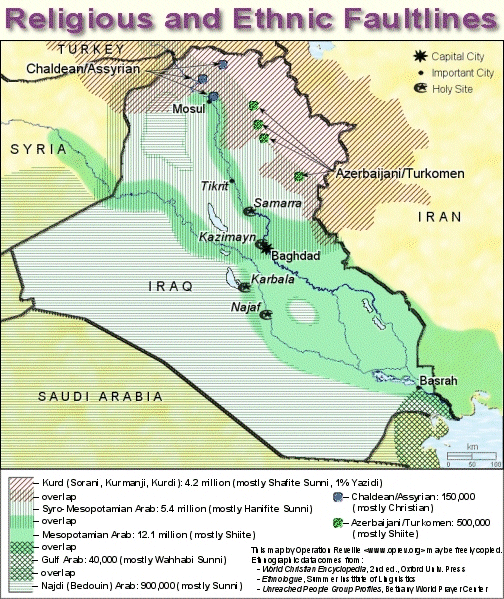
Weapons of mass destruction sit not only in the hands of a volatile dictator but also at the center of religious conflicts between two kinds of Arabs, the Kurds, and several exotic minorities.
In doctrine and bloody rivalry, Sunni and Shiite history parallels that of Protestants and Catholics. Sunni standards for faith and practice derive primarily from "the written word" -- the Qur'an and Sunna. Ancient biographical stories about Muhammad called Haddiths are compiled to make the Sunna. (Accounts of Jesus are gospels.) The principle of relying on "only the Qur'an and Haddith" parallels the Protestant reformers' slogan "sola scriptura."
As Roman Catholics believe Saint Peter's divine leadership passes down through a succession of Popes, Shiites maintain that Muhammad's divine authority continued in a line of Imams that began with Ali, Muhammad's cousin and son-in-law. Although the line of Imams terminated with the twelfth who is supposed to return as a messiah, Shiites still revere their Ayatollahs, but Sunnis disdain them the way Protestants disregard priests and popes.
Sunni orthodoxy, like Protestantism, considers venerating saints to be heresy (though many Sunni are not orthodox in this regard). For Shiites, tombs and relics of the Imams establish holy sites for pilgrimage. Shiite Islam's four holiest cities, Najaf, Karbala, Kazimayn, and Samarra, are all in Iraq.
In the war against Shiite Iran (1980-88), Saddam Hussein minimized Islam's distinctions and civic role. He united Shiites and Sunnis around himself and a common Arab identity.
During the Gulf War, however, most Iraqi Shiites allied themselves with the coalition against Hussein. Since then, Shiites have been marginalized and their pilgrimages restricted. Over half of Iraq's population is Shiite.
Saddam Hussein's tightly knit power base falls within the minority Syro-Mesopotamian Arabs who comprise just one quarter of the population. They are mostly Sunni Muslims of the Hanafite system of Muslim law and predominate centrally between the mountains and lowlands. Saddam Hussein himself hails from Tikrit, a town on the banks of the Tigris River just north of Baghdad.
The Kurds are also oppressed. They live in mountains across Syria, Turkey, Iran, and Iraq. They are mostly Sunni Muslims of the Shafite system of Muslim law, but they speak several dialects and belong to different political factions. In their bid for national autonomy, they end up fighting each other more than their respective host country governments. Yes, Saddam Hussein has used nerve gas to subdue these rebellious citizens of his own nation, but he would hardly consider them to be his own people.
Other sometimes persecuted groups trying to keep a low profile include Christian Assyrians and Chaldeans, Shiite Persians (from Iran) Azerbaijanis (also called Turkomen), and Sunni Bedouins speaking the Nadji Arabic dialect.
Some Iraqis practice Mandaeanism which traces back to 2nd century gnosticism. Some of the Kurds practice Yazidi which mixes elements from Judaism, Zoroastrianism, Mandaeanism, Nestorian Christianity, and Islam. Jews in Iraq have dwindled from 250,000 before WWII to fewer than 200. The Baha'i religion was outlawed in 1970, but about 2,600 practitioners remain. Arab Christians in Iraq are few but growing.
Most of Iraq's Christians have ancient roots. Like the native American Indians, Iraqi Christian peoples have either been killed off, assimilated, or "put on reservations" to be preserved as curiosities. Chaldeans, Assyrians and Syrians use Syriac liturgy, and still speak Syriac language in some villages. In small, mostly Christian communities, state schools actually teach Christian religion. Some Armenian Orthodox and Armenian Catholics established communities in Iraq when they fled post WWI Turkish massacres. Roman Catholic expatriates do medical and educational work around Baghdad and Mosul.
Resouce Contact Information
| R E S O U R C E S F O R M I N I S T R Y I N I R A Q | |||
| Resources | Sponsors | Phone Number | Web Site |
|
Online digital Scriptures: various Arabic dialects, Azerbaijani, Farsi and Kurdish dialects |
Ethnic Harvest International Bible Society Farsi Net (Farsi) The Grace (Arabic) Arabic Bible Outreach Bible Gateway |
- - - - - - |
www.ethnicharvest.org/bibles www.gospelcom.net/ibs/bibles www.farsinet.com/bible www.thegrace.com www.arabicbible.com www.bible.gospelcom.net/languages |
|
Christian Radio Broadcasting: Arabic dialects, Azerbaijani Kurmanji, & Kurdi |
(broadcast frequencies & times) Trans World Radio (TWR) FEBA / FEBC |
- 1-800-456-7897 1-562-947-4651 |
www.febc.org/phptest/wbr/index.php3 www.twr.org www.feba.org.uk |
|
Christian Television: Arabic dialects & Farsi |
Sat7 (program guide) | 1-610-995-9151 | www.sat7.org |
|
Audio Messages & Scriptures: various Arabic dialects, Azerbaijani, Farsi, Sorani & Kurmanji Kurdish |
Faith Comes by Hearing Audio Scripture Ministries Bible Gateway (online in Farsi) Global Recordings Network |
1-800-545-6552 1-941-748-4100 - 1-888-444-7872 |
www.fcbh.org www.gospelcom.net/aurora/pages/general/home.htm http://bible.gospelcom.net/languages www.gospelrecordings.com/catalog |
|
Bibles & New Testaments: various Arabic dialects, Azerbaijani, Farsi, Kurdish dialects, Aramaic & Syriac |
Amazon.Com Multi-Language Media The Good Way International Bible Society American Bible Society Scripture Gift Mission |
- 1-717-738-0582 - 1-800-524-1588 1-800-322-4253 1-877-873-2746 |
www.amazon.com www.multilanguage.com www.the-good-way.com www.gospelcom.net/ibs www.americanbible.org www.gospelcom.net/asgm |
|
Books & Literature: various Arabic dialects, Azerbaijani, Farsi, & Kurdish dialects |
Multi-Language Media CCCI (Four Spiritual Laws) Arab World Ministries The Good Way |
1-717-738-0582 1-407-826-2000 1-800-447-3566 - |
www.multilanguage.com ccci.org/laws/languages.html www.gospelcom.net/awm/resource.htm www.the-good-way.com |
|
Arab Christian Resources: audio, video, magazines books & literature |
Middle East Media Arabic Bible Outreach Good News Radio Hadith Al-Asdika The Light of Life Through the Bible Voice of Preaching the Gospel Call of Hope |
- - - - - - 1-719-574-5900 - |
www.middleeastmedia.org www.arabicbible.com www.inarabic.org/index1.htm www.domini.org/malaga www.light-of-life.com www.ttb.org/arabic.htm www.vopg.org www.call-of-hope.com |
|
Farsi Christian Resources: |
Farsi Net | - | www.farsinet.com |
|
Jesus Film, Video & DVD: all major Iraqi languages |
CCCI, Jesus FILM Project Multi-Language Media |
1-800-560-8713 1-717-738-0582 |
www.jesusfilm.org www.multilanguage.com |
|
Christian Videos: in Arabic note: VTV has many titles! |
Jeremiah Films Arab World Ministries Films for Christ Vision Through Video (VTV) |
1-800-828-2290 1-800-447-3566 1-800-332-2261 Cyprus 3574650953 |
www.jeremiahfilms.com www.gospelcom.net/awm/resource.htm www.EdenCatalog.com e-mail: vtvcy@vtvcy.charis.co.uk |
|
Bible Correspondence Courses: in Arabic & Farsi |
Voice of Preaching the Gospel | 1-719-574-5900 | www.vopg.org/free/bible_corr.htm |
|
Language Learning: phrases & products online self study courses Kurmanji dictionary and lessons |
TravLang.Com Transparent.Com POC: Ms. Cherie Rempel |
- 1-888-245-1829 1-703-455-5741 |
www.travlang.com/languages/cgi-bin/langchoice.cgi www.transparent.com e-mail: CJRempel@cs.com |
|
Classic Bible Films: (in English) |
Mount Carmel | 1-800-272-2442 | www.mountcarmel.com/cart/videos/biblical.htm |
| R E S O U R C E S F O R U N D E R S T A N D I N G A N D M I N I S T E R I N G | ||
| Resources | Phone Number | Web Site |
|
Working With Middle-Easterners online brochure Center for Ministry to Muslims material on Islam Arab World Ministries material on Islam Dialog / Q&A via the Internet Support for Christian Women Married to or Dating Muslim Men |
1-770-410-6000 - 1-800-447-3566 - - |
www.namb.net/cp/About_CPG/brochures.asp www.cmmequip.org www.gospelcom.net/awm answering-islam.org www.domini.org/lam/home.html |
| R E C O M M E N D E D R E A D I N G | ||
| Title | Author | Publisher |
|
Daughers of Islam: Building Bridges with Muslim Women Magic and the Kingdom of God: Church Planting Among Folk Muslims Ministry to Muslim Women: Longing to Call Them Sisters Touching the Soul of Islam: Sharing the Gospel in Muslim Cultures The Cross and the Crescent: Reflections on Christian-Muslim Spirituality |
Miriam Adeney Rick Love Fran Love & Jeleta Eckheart Bill Musk Phil Parshall |
Intervarsity Press, 2002 William Carey Library, 2000 William Carey Library, 2000 Broadway House, 1995 Tyndale House, 1989 |